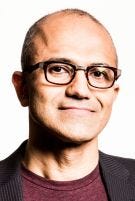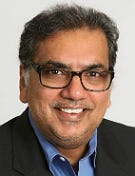Microsoft: Massive Reorg Will Lead to 'Intense and Maniacal Focus'Microsoft: Massive Reorg Will Lead to 'Intense and Maniacal Focus'
With this reorg, Microsoft strives to become the essential business-infrastructure company.
March 29, 2018

Microsoft CEO Satya Nadella on Thursday announced a major company reorganization that puts meat on the bones of his vision for the intelligent cloud and intelligent edge — which he’s said will shape the next phase of innovation. Nadella spoke about this vision at Microsoft Ignite in September 2017.
Nadella shared the news in an email to employees. He announced the formation of two new engineering teams — one focused on experiences and devices, and a second focused on cloud and artificial intelligence (AI). He also explained the drivers for the reorganization.

Microsoft’s Satya Nadella
“The purpose of the Experiences & Devices team is to instill a unifying product ethos across our end-user experiences and devices,” Nadella wrote. “The purpose of the [Cloud + AI Platform] team is to drive platform coherence and compelling value across all layers of the technology stack, starting with the distributed computing fabric (cloud and edge) to AI (infrastructure, run times, frameworks, tools and high-level services around perception, knowledge and cognition).”
With this reorg, Microsoft strives to become the essential business-infrastructure company.
“Today, we are in a post-transactional market, where everything is delivered as a service. With this backdrop, it makes sense for Microsoft to reorganize around cloud – Azure, Office, AI – the segments with huge runways and growth potential,” said Anurag Agrawal, CEO and analyst at Techaisle. “Going forward, we should expect to see intense and maniacal focus on everything cloud that provides solutions to the end customer’s biggest pain points.”

Techaisle’s Anurag Agrawal
The reorganization results in at least a dozen changes at the executive level. Particularly noteworthy is the departure of 21-year Microsoft veteran and Windows chief Terry Myerson. While discussions about Myerson’s departure were in the works for some time, he described the reality of waking up to the change today as “emotional,” in a blog.
Rajesh Jha, executive vice president, was tapped to lead the Experiences & Devices team. The Cloud + AI Platform team will be led by Scott Guthrie, executive vice president, who will expand his current responsibilities.
Jha’s team will also include Panos Panay, who will serve as chief product officer; Joe Belfiore, corporate vice president, Windows 10; Kudo Tsunado, corporate vice president; and Brad Anderson, also a corporate vice president.
Guthrie’s team includes many existing Microsoft leaders. To name a few, Jason Zander is being promoted to executive vice president, Azure; Alex Kipman will lead the AI perception & mixed reality team, Eric Boyd will lead the AI cognitive services and platform team, and Harry Shum will continue to head the third engineering team, AI + Research.
Today’s news is substantial for the Redmond company, very much in line with Nadella’s “Hit Refresh,” thinking and transformational mindset. “Hit Refresh,” published in September, is Nadella’s book about his personal journey, reinvention of Microsoft’s soul and his vision for its future.
“Over the past year, we have shared our vision for how the intelligent cloud and intelligent edge will shape the next phase of innovation. First, computing is more powerful and …
… ubiquitous from the cloud to the edge. Second, AI capabilities are rapidly advancing across perception and cognition fueled by data and knowledge of the world. Third, physical and virtual worlds are coming together to create richer experiences that understand the context surrounding people, the things they use, the places they go, and their activities and relationships,” Nadella wrote.
“These technological changes represent a tremendous opportunity for our customers, our partners — everyone. With all this new technology and opportunity comes a responsibility to ensure technology’s benefits reach people more broadly across society. It also requires that the technologies we create are trusted by the individuals and organizations that use them.”
Earlier this week, Morgan Stanley placed its bets on Microsoft reaching a $1 trillion cap in 12 months, representing a 40 percent surge.
“Strong positioning for ramping public-cloud adoption, large distribution channels and installed customer base, and improving margins support a path to $50 billion in EBIT and a $1 trillion market cap for MSFT,” wrote Morgan Stanley’s Keith Weiss.
Read more about:
AgentsAbout the Author
You May Also Like


